Search the Special Collections and Archives Portal
Search Results
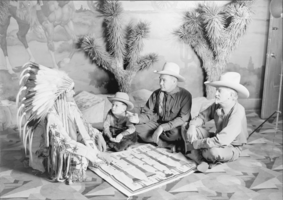
Film transparency of Lone Wolf, Captain Joyce and Cunnel Russell at the Apache Hotel, Las Vegas, circa 1930s-1940s
Date
1930 to 1949
Archival Collection
Description
Black and white image of Lone Wolf of Browning, Montana, Capt. Joyce of Tucson, Arizona, and "Cunnel" Russell sitting in the cocktail room of the Apache Hotel.
Image
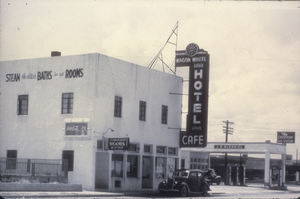
Slide of the Wagon Wheel Hotel, Wells, Nevada, circa 1940
Date
1939 to 1941
Archival Collection
Description
An image of the exterior of the Wagon Wheel Hotel located in Wells, Nevada. The neon sign hanging off of the side of the building reads: "Wagon Wheel Hotel, Cafe." Painted on another side is the text: "Steam Heated Baths in all Rooms." A sign advertising the Chevron Gas Station can be seen in the background. Site Name: Wagon Wheel Hotel (Wells, Nev.)
Image
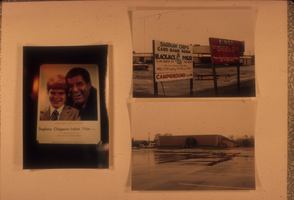
Slide of three photographs for the Saginaw Chippewa Indian Tribe Saginaw Chips Card Game Room, Mt. Pleasant, Michigan, circa 1960s-1970s
Date
1960 to 1979
Archival Collection
Description
Three photographs for the Saginaw Chippewa Indian Tribe Saginaw Chips Card Game Room, Mt. Pleasant, Michigan. The photograph on the left features a unidentified young boy with Jerry Lewis for the Muscular Dystrophy Telethon. The top right photo shows two billboards, with the first one advertising the Saginaw Chips Card Game Room and the second one advertising Bingo. The bottom right photo features a building, possibly the Saginaw Chips Card Game Room.
Image

Photograph of Montyce Hackett and a newborn colt, Nellis Air Force Base, Nevada, June 24, 1976
Date
1976-06-24
Archival Collection
Description
Montyce Hackett (daughter of Lt. Col. and Mrs. Dick Hackett) with the first colt born at the Nellis Air Force Base (according to memory at the time). Site Name: Nellis Air Force Base (Nev.)
Image
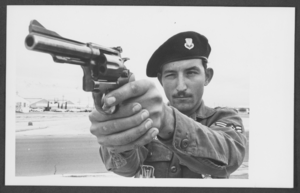
Photograph of Airman First Class James Giampeetro in a marksmanship contest, Vandenberg Air Force Base, California, October 6, 1976
Date
1976-10-06
Archival Collection
Description
A1C (Airman First Class) James A. Giampeetro, representative for Nellis Air Force Base (Nevada), aiming a revolver during a worldwide marksmanship contest at Vandenberg Air Force Base, California.
Image
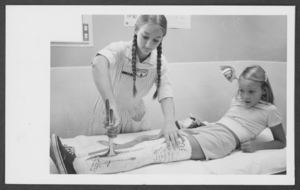
Photograph of Celeste Kohr removing a leg cast from a girl, Nellis Air Force Base, Nevada, August 18, 1976
Date
1976-08-18
Archival Collection
Description
Celeste Kohr, a Red Cross volunteer, removing a leg cast from a girl at Nellis Air Force Base (Nevada) Hospital. Site Name: Nellis Air Force Base (Nev.)
Image

Photograph of Airman First Class Rory Vaughn, Nellis Air Force Base, Nevada, November 19, 1979
Date
1979-11-19
Archival Collection
Description
Airman First Class Rory Vaughn sawing lumber, Nellis Air Force Base, Nevada . Site Name: Nellis Air Force Base (Nev.)
Image
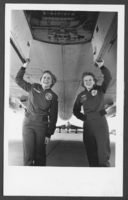
Photograph of Cadets First Class Andrea Ungashick and Sue Henke visiting Nellis Air Force Base, Nevada, December 3, 1979
Date
1979-12-03
Archival Collection
Description
Cadets First Class Andrea Ungashick and Sue Henke, of the U.S. Air Force Academy, pose beneath a plane while they visit Nellis Air Force Base, Nevada. Site Name: Nellis Air Force Base (Nev.)
Image
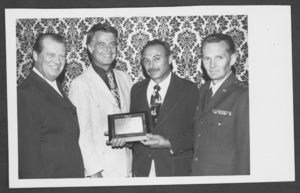
Photograph of Colonel George T. Anton receiving sn award, Nellis Air Force Base, Nevada, October 5, 1976
Date
1976-10-05
Archival Collection
Description
Colonel George T. Anton, U.S. Army (Ret.) (2nd from right), receives an award for outstanding reserve officer of the year from Las Vegas Mayor Bill Briare, (2nd from left). At far left is Lt. Col. Scott Griffith; at far right is Major Gen. Charles. Blanton. Site Name: Nellis Air Force Base (Nev.)
Image
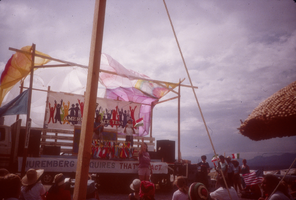
Slide of people on a stage at an American Peace Test demonstration near the Nevada Test Site, June 1986
Date
1986-06
Archival Collection
Description
Color image of people on and around a stage set up for a demonstration held on World Peace Day by American Peace Test, a group protesting nuclear testing. The stage has large banners and displays many international flags. One of the banners reads, "Nuremberg requires that we act."
Image
Pagination
Refine my results
Content Type
Creator or Contributor
Subject
Archival Collection
Digital Project
Resource Type
Year
Material Type
Place
Language
Records Classification
